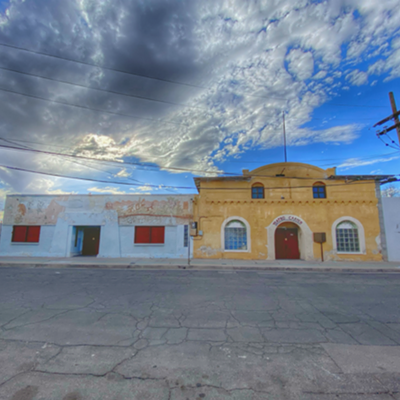It's been derided for its location and chastised for not having enough bells and whistles. It's been abandoned by not one, but three high-profile tenants.
Yet 14 years after it was built, all signs point to Kino Veterans Memorial Stadium and the surrounding athletic complex becoming a respected—if not quite profitable—multi-use facility.
"It's become a much-more diversely used recreational and sports facility than we could have expected," said Pima County Administrator Chuck Huckelberry. "We want to make Kino a mecca for basically every sport that's attractive for the community."
The complex has become known for more than just sports, though. While its stadium will play host to baseball, football, soccer and possibly rugby over the next six months, additional events such as concerts, charity functions and even an exotic fish exhibition have been held at the facility on Ajo Way and Country Club Road.
"The complex is being used a lot more than people even come close to understanding," said Mike Feder, general manager of the Tucson Padres minor-league baseball team, whose office is steps from a playing surface that has been converted to accommodate the inaugural Casino del Sol College Football All-Star Game, slated for Jan. 16. "We had a koi show here last week. This is not a ghost town."
When it opened in early 1998, Kino Stadium—known then as Tucson Electric Park—was envisioned as a venue for baseball, and little else. With two Major League Baseball teams using it for spring training, followed by five months of Tucson Sidewinders minor-league baseball, there wasn't a need to find other uses.
But then the Chicago White Sox broke their lease in 2008 and moved to Glendale. The Sidewinders were sold the same year and moved to Reno, Nev. The Arizona Diamondbacks exercised a clause in their spring-training contract and bolted to Scottsdale after the 2010 season, and revenue from the stadium all but dried up. Only $190,000 was taken in from non-spring-training games during the 2009-10 fiscal year.
But revenue rose to $490,000 in 2010-2011, and projections for the current fiscal year have it jumping to around $700,000, Huckelberry's report indicates.
It could go even higher in future years, Huckelberry said, depending on how a handful of upcoming events fare.
Still, county taxpayers are providing the stadium with an ample subsidy.
"For each of the last two years, we have provided a $1.5 million general-fund subsidy to the stadium. This subsidy has been used to provide maintenance and operational support for the public use of the facilities. Given the improving revenue outlook and reduced costs, it is likely this subsidy can be reduced by $500,000 for FY 2012/13," Huckelberry wrote in his report. This is in addition to the approximately $3 million per year the county is paying in debt service through 2018.
In addition to the all-star football game, the complex will serve as the training compound for a quartet of Major League Soccer teams from January through early March. That will include at least four exhibition games involving MLS teams and FC Tucson, a local semi-professional soccer club. The hope is that if MLS likes how things go, Tucson will become the league's permanent West Coast preseason home, Huckelberry's report notes.
"This is kind of a test year coming up in soccer," Huckelberry said.
The same can be said for Kino's use as a preseason training facility for two Korean pro baseball teams, the NC Dinos and the Hanwha Eagles, which have signed contracts to use the complex's practice fields from January through mid-March.
"We're also getting a lot of interest from a third team, the Kia Tigers," said Tom Tracy, the chairman and a founding member of the Pima County Sports and Tourism Authority. "(The Korean teams are) just training here this year. They might play games next year."
The authority was formed in 2008 by local businessmen, many of them in the tourism industry, such as Tracy, who owns a hotel-management company. It was a last-ditch effort to keep spring training in Tucson. Although that effort proved unsuccessful, the authority remains active, and Huckelberry says it has played a key role in bringing many events to Kino.
"This spring, the cross-section of activities have Kino basically as full as it can get during January, February and March," Tracy said. "We're very proud to have taken on a role in making that happen. We have been working with all kinds of various groups to find the right combination."
While county projections have the MLS bringing in about $100,000, with each of the Korean baseball teams expected to pay $25,000 for facility use, some of the most-profitable Kino events have not involved sports.
KFMA's Fall Ball concert brought in $73,000 for one day of use in October, and another $60,000 is expected from the station's KFMA Day concert in May.
"It's a great venue; it works extremely well for us," said Steve Groesbeck, general manager of KFMA parent Arizona Lotus Corp.
Huckelberry said such concerts bring in more money than an entire minor-league baseball season. The Tucson Padres, the Triple-A affiliate of the San Diego Padres, generated just less than $54,000 this year. The money came from a 50-cent-per-ticket surcharge the Padres agreed to pay the county.
The Padres are still considered a valuable tenant, Feder said, because they provide revenue during the summer, when it's difficult to draw events to Tucson.
"We give them occupancy in the worst time of the year," Feder said.
Kino's success shouldn't just be based on revenue, Huckelberry said, because it's a community facility that is providing space to smaller-scale events such as Pima Community College football games and the Hope Fest fundraiser.
"For every event that makes a lot of money, there are 100 events that don't," Huckelberry said. "But that's OK, because those are community events, and that's what (this) is for."
More publicity for Kino could help, which is why the sports and tourism authority continues to talk with the county about putting up signs around the complex—possibly along its ample Interstate 10 frontage—to help promote lesser-known events.
"The county, they're not in the marketing and advertising business," Tracy said. "We're trying to prod them along. We would support such a sign, because I think it's the consensus of the community that (Kino) is a great big white elephant with nothing in there. There's nothing further from the truth."






